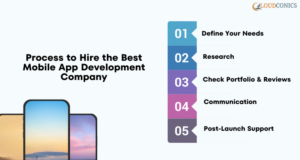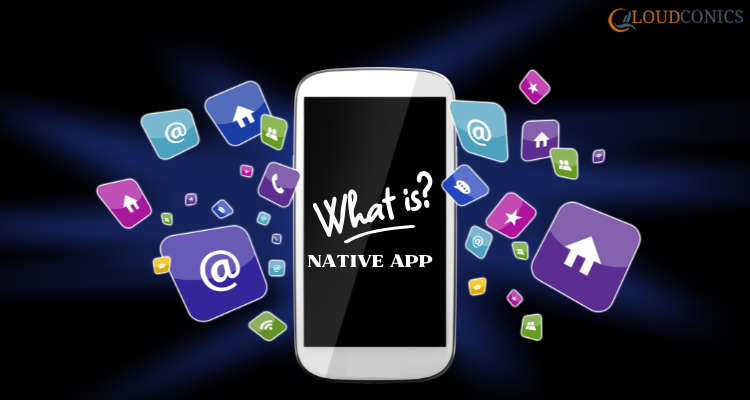
 January 28, 2025
January 28, 2025
Mobile Application Development for Businesses: A Complete Guide
1) Introduction
In today’s fast-paced, digital-first world, businesses need to adapt quickly to meet customer expectations. A mobile application is no longer a mere luxury for businesses but an essential tool for customer engagement, sales, and brand visibility. According to recent statistics, by 2026, the global number of mobile app downloads across platforms is projected to exceed 300 billion (Statista). This massive growth reflects the ever-increasing reliance on smartphones, which businesses can capitalize on to drive revenue, streamline processes, and engage customers more effectively.
This guide provides an in-depth look at mobile app development for businesses—why it matters, how it works, and the process of building and launching your first mobile app with Cloudconics.
2) What is Mobile App Development?
Mobile app development is the process of creating software applications that run on mobile devices like smartphones and tablets. These applications can be designed for a wide variety of purposes, from enhancing user experience to supporting business functions like sales, customer service, and communication. The process typically involves:
- Planning and Strategy: Understanding user needs, business objectives, and the app’s purpose.
- Designing UI/UX: Creating an intuitive, attractive design that ensures the app is user-friendly and functional.
- Development: Writing code for the app’s core features, integrating APIs, and connecting back-end systems.
- Testing: Rigorous testing ensures that the app functions smoothly, is secure, and meets performance expectations.
- Deployment and Maintenance: Launching the app on relevant app stores (Apple App Store, Google Play Store) and providing ongoing support.
3) Pain Points Without Mobile App Development
The absence of a dedicated mobile app can create numerous challenges for businesses:
- Limited Engagement: Customers now expect real-time updates, seamless transactions, and quick responses—all of which are easier to provide through an app. Without one, businesses miss out on direct, instant communication.
- Lower Visibility: Without a mobile app, your brand is not constantly visible on a user’s phone, where it can be easily accessed with a single tap. This lack of presence can affect customer loyalty and brand recognition.
- Reduced Revenue Opportunities: Mobile apps provide a variety of revenue-generating features, from in-app purchases to subscriptions and advertisements, which are not possible through websites alone.
- Poor Customer Experience: Websites might not offer the same speed or ease of use as mobile apps, especially for users on-the-go. A mobile app ensures smoother interactions, faster load times, and offline capabilities.
4) Why Should Companies Go for Mobile App Development and Which Industries Benefit?
Why Businesses Need Mobile Apps:
- Customer Convenience and Accessibility: Mobile apps make it easy for customers to access your services and products wherever they are, providing a convenient and seamless experience.
- Increased Customer Loyalty: Mobile apps allow businesses to build loyalty programs, provide discounts, or offer personalized content, leading to more repeat customers and higher retention rates.
- Increased Sales and Revenue: Businesses can use apps to encourage in-app purchases, offer deals, and streamline their purchasing process, leading to increased revenue.
- Real-Time Interaction: Mobile apps enable businesses to send push notifications, promotions, and messages to customers directly, allowing for instant engagement.
Industries That Benefit from Mobile App Development:
- E-Commerce: E-commerce companies benefit from mobile apps by offering a smooth shopping experience, personalized recommendations, and instant checkout features.
- Healthcare: Mobile apps allow patients to book appointments, access health records, and consult with healthcare professionals remotely, providing greater convenience.
- Education: Educational institutions use mobile apps for delivering e-learning content, course materials, and interaction with instructors.
- Real Estate: Real estate apps provide seamless property browsing, virtual tours, and easy communication with agents, improving both buyer and seller experiences.
- Travel & Tourism: Apps offer booking services, itinerary management, and real-time notifications, enhancing the travel experience for customers.
And many more….
5) Types of Mobile Applications
There are several types of mobile applications, each suited to different business needs:
- Native Apps: Native apps are built specifically for iOS or Android platforms using the respective programming languages (Swift for iOS, Java for Android). These apps are high-performing and offer the best user experience but are platform-dependent.
- Hybrid Apps: These apps are developed using web technologies (HTML, CSS, JavaScript) and wrapped in a native container, making them accessible across multiple platforms. Hybrid apps are faster to develop but may not offer the same performance as native apps.
- Web Apps: Web apps run within a browser and don’t require installation. They are often more limited in functionality compared to native apps but are cost-effective and easy to update.
- Progressive Web Apps (PWAs): PWAs combine the best aspects of native apps and web apps. They are fast, reliable, and can work offline, making them an ideal choice for businesses that want to provide a mobile app-like experience without the complexities of development.
Read the Blog on Mobile App Development Technologies: For a deeper dive into the best technologies for mobile app development, including details on the top frameworks, tools, and languages to use for iOS and Android apps, check out our detailed blog on mobile app development technologies.
6) Process to Hire the Best Mobile App Development Company
When selecting a mobile app development company, follow these steps to ensure you find the right team for your needs:

- Define Your Needs: Clearly outline your requirements, such as platform preference (iOS, Android, or both), budget, timeline, and app features.
- Research: Look for companies with relevant experience in your industry and expertise in developing the type of app you need (native, hybrid, PWA).
- Check Portfolio & Reviews: Examine their past projects and client feedback. A company with a solid portfolio and positive reviews will have proven experience in delivering quality apps.
- Communication: Effective communication is key. Ensure the company is responsive and understands your goals. A transparent development process will help you stay informed throughout the project.
- Post-Launch Support: Apps need constant updates and bug fixes. Ensure the company offers post-launch maintenance and support services.
7) How We Launched One of Our Client Applications: A Real-World Example
At Cloudconics, we recently helped a client in the real estate sector launch a successful mobile app. Here’s a detailed look at the process:
- Initial Consultation and Planning: The client wanted to create an app that allowed users to browse property listings, schedule viewings, and contact agents directly through the app. After understanding their requirements, we conducted market research to understand the competitive landscape and the latest trends in real estate mobile apps. The industry is experiencing a 10% annual growth in mobile adoption, with many customers preferring apps for property search (Source: Statista).
- Design and Development: Our team of UI/UX designers created a sleek, intuitive interface that aligned with the client’s brand. After finalizing the design, we began development. Using agile methodology, we built the app incrementally, testing each feature as we went.
- User Testing and Feedback: After completing the initial build, we ran a closed beta test with a select group of users. Feedback indicated that users wanted a feature for virtual tours, which we promptly integrated. Statistics show that 58% of homebuyers prefer virtual tours over in-person showings, making this feature critical (Source: Statista).
- Launch and Marketing: After successfully testing the app, we launched it on the Google Play Store and Apple App Store. To generate buzz, we collaborated with the client’s marketing team to run targeted ad campaigns, including push notifications to engage potential users. In the first month post-launch, the app garnered 5,000 downloads and helped the client increase user engagement by 25%.
- Post-Launch Support: Following the launch, we provided ongoing support, including regular updates based on user feedback. This ensured the app remained bug-free and aligned with the client’s evolving business needs.
8) How Cloudconics Helps You Launch Your First Mobile Application
At Cloudconics, we’re dedicated to turning your app idea into reality with a seamless, end-to-end approach. Here’s how we support your journey:
- Consultation and Strategy: From day one, we collaborate with you to understand your business goals, target audience, and specific needs. Our team helps you define the app’s core functionality and features, ensuring the app aligns with your business objectives.
- UI/UX Design Excellence: We believe that an app’s design is just as important as its functionality. Our designers craft intuitive, attractive user interfaces that enhance the user experience and ensure customer satisfaction.
- Agile Development: Using agile methodologies, we deliver your app in stages, allowing for regular feedback and adjustments. This approach ensures we meet your expectations and timelines.
- Quality Assurance & Testing: Our rigorous testing processes ensure that your app works flawlessly across all devices and platforms. We fix bugs, optimize performance, and ensure a seamless user experience.
- App Store Submission & Marketing: We handle the entire app submission process to the Google Play Store and Apple App Store, ensuring compliance with all guidelines. We also provide marketing strategies to boost your app’s visibility and downloads.
- Post-Launch Support and Updates: Our job doesn’t end at launch. We offer ongoing maintenance and updates to ensure your app remains secure, bug-free, and up-to-date with new features.
9) Conclusion
Mobile app development is a crucial investment for businesses looking to improve customer engagement, streamline operations, and drive growth. From e-commerce to real estate, mobile apps are transforming industries by offering personalized, real-time experiences. With the help of Cloudconics, businesses can launch successful mobile applications that meet their goals and exceed user expectations.

Aditya Aggarwal
Aditya Aggarwal is a seasoned tech writer and Zoho enthusiast with over 5 years of experience exploring and explaining Zoho’s suite of tools. He writes daily blogs aimed at helping businesses optimize their workflows, improve productivity, and master Zoho applications for better customer relationship management.







